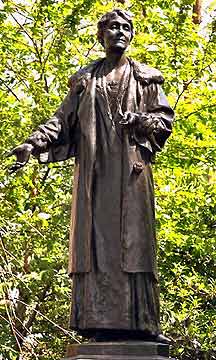Emmeline Pankhurst (1858-1928)
© 2007
Armchair Travel Co. Ltd. - This page may be used for non-commercial purposes
ONLY!
![]()

[ Play
Narrated and Animated Movie ! ] This statue is erected in memory of Emmeline Pankhurst (1858-1928), the militant champion of the Womens' Suffrage movement. Pankhurst campaigned for forty years for full equality for British Women. From 1906 she directed "The Women's Social and Political Union" from London, leading many campaigns for women's rights, and being jailed for her militant activities - which included disrupting the meetings of various Cabinet Ministers. In 1913 she was imprisoned for her actions at least 12 times, and during World War I, she stayed in the United States lecturing on the Womens' Suffrage movement.
Pankhurst returned to England in the 1920s and achieved complete success in the year of her death, 1928, when equality of voting for both men and women was established by "The Representation of the People Act" - passed only a few weeks before her death.
We women suffragists have a great mission - the greatest mission the world has ever known. It is to free half the human race, and through that freedom to save the rest. After having studied in Paris between 1873 and 1877, Emmeline Goulden returned to England to her former home town of Manchester and married Richard Marsden Pankhurst in 1879. Pankhurst, a lawyer, had also been the author of the first Woman's Suffrage Bill in Great Britain, and of the Married Women's Property acts. Together they strove to promote equality for women.
In 1889 the 'Women's Federation League' was formed, Emmeline being one of its founder members. Within five years this body succeeded in promoting the passage of a law granting women the right to vote in local elections, however not in Parliament.
In 1903 Pankhurst founded the 'Women's Social and Political Union' (WSPU) in Manchester, although the group only really came to prominence when Emmeline moved its headquarters to London. Then the WSPU was able to hold public meetings and lead protest marches around the city, and in particular to the Houses of Parliament. It was recognised as an extremely organised body, and was run much like a volunteer army.
In 1906 this group of campaigners were nicknamed 'suffragettes' by the Daily Mail - a name which stuck with them ever after. As the suffrage campaign grew, Emmeline's daughter Christabel joined as co-leader. The WSPU members and its leaders, the Pankhursts, became increasingly militant in the early years of this century. Emmeline Pankhurst was actually arrested and put in prison several times between 1908 and 1913.
The beginning of the War in 1914 caused Emmeline and the WSPU to postpone campaigning, and to direct their energies into war work instead.
Having spent some of the War years lecturing on Women's suffrage in the United States, Pankhurst returned to England in the 1920s and achieved complete success when equality in voting practice was finally established by the 'Representation of the People Act', which was passed only a few weeks before Emmeline's death in 1928.
The argument of the broken pane of glass is the most valuable argument in modern politics.
What an extraordinary mixture of idealism and lunacy. Hasn't she the sense to see that the very worst method of campaigning for the franchise is to try to intimidate or blackmail a man into giving her what he would gladly give her otherwise.
[ Virtual
Tour ] [ Main Topics
Index ]

Additional Information on
Emmeline Pankhurst (1858-1928)
QUOTATIONS
- E. Pankhurst, 'Votes for Women' 23rd Feb 1912.
- David Lloyd George quoted by his son Richard Lloyd George.
Explore-Parliament.net: Advanced Category Search
Keyword - E. Pankhurst. Categories:
_Object_Sculpture
_Object_Artwork
_Object_Portrait
_Woman
_Person
_Artist_Walker
_Pankhurst